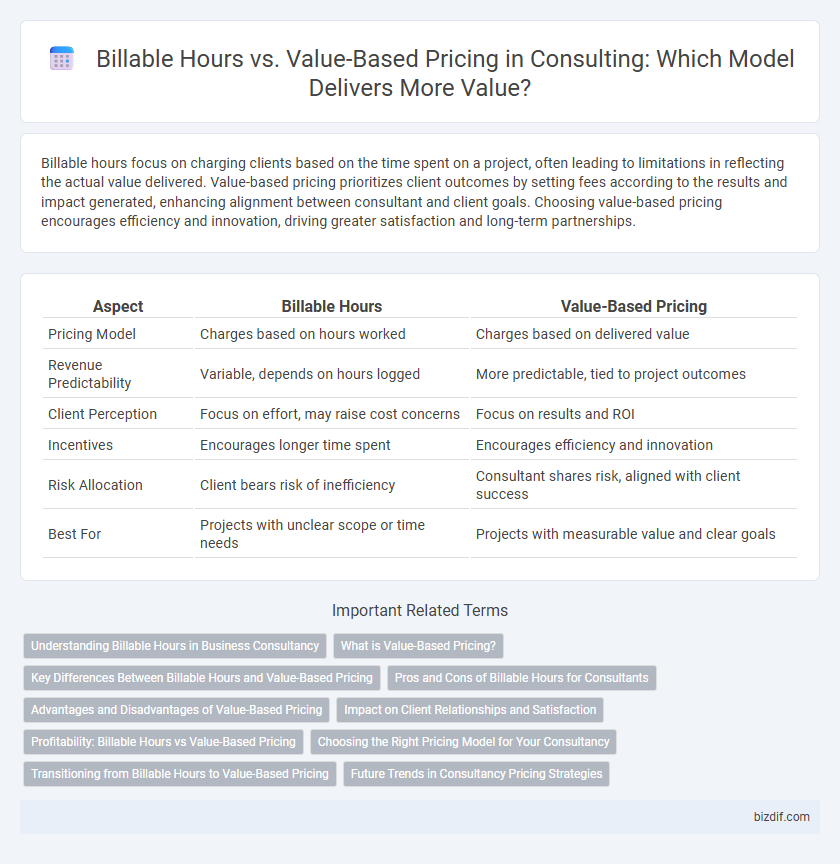Billable hours focus on charging clients based on the time spent on a project, often leading to limitations in reflecting the actual value delivered. Value-based pricing prioritizes client outcomes by setting fees according to the results and impact generated, enhancing alignment between consultant and client goals. Choosing value-based pricing encourages efficiency and innovation, driving greater satisfaction and long-term partnerships.
Table of Comparison
| Aspect | Billable Hours | Value-Based Pricing |
|---|---|---|
| Pricing Model | Charges based on hours worked | Charges based on delivered value |
| Revenue Predictability | Variable, depends on hours logged | More predictable, tied to project outcomes |
| Client Perception | Focus on effort, may raise cost concerns | Focus on results and ROI |
| Incentives | Encourages longer time spent | Encourages efficiency and innovation |
| Risk Allocation | Client bears risk of inefficiency | Consultant shares risk, aligned with client success |
| Best For | Projects with unclear scope or time needs | Projects with measurable value and clear goals |
Understanding Billable Hours in Business Consultancy
Billable hours in business consultancy refer to the tracked time consultants spend on client projects, which directly translates to revenue based on hourly rates. This model emphasizes accurate time management and detailed record-keeping to ensure clients are charged fairly for the consultant's efforts. Understanding billable hours is crucial for maximizing profitability while maintaining transparency and trust with clients.
What is Value-Based Pricing?
Value-based pricing is a consultancy pricing strategy where fees are determined by the perceived value delivered to the client rather than the number of hours worked. This model aligns consultant compensation with client outcomes, driving efficiency and fostering stronger client relationships. Consultants using value-based pricing often charge premiums for expertise and impactful results, contrasting with billable hours that emphasize time spent.
Key Differences Between Billable Hours and Value-Based Pricing
Billable hours focus on tracking time spent on tasks, charging clients based on actual hours worked, while value-based pricing emphasizes the outcomes and value delivered to the client rather than time invested. Billable hours may limit profit potential and client satisfaction due to fixed rates per hour, whereas value-based pricing aligns incentives by rewarding consultants for solving problems effectively and efficiently. Professionals adopting value-based pricing often experience increased revenue and stronger client relationships by prioritizing project impact over time consumption.
Pros and Cons of Billable Hours for Consultants
Billable hours provide consultants with straightforward revenue tracking by charging clients based on the actual time spent on tasks, ensuring transparency and ease of invoicing. However, this model can discourage efficiency, as consultants may feel incentivized to extend project timelines, and clients might question the value received relative to time billed. The unpredictability of hours worked often leads to disputes over costs and can limit the consultant's ability to demonstrate the true strategic impact of their work.
Advantages and Disadvantages of Value-Based Pricing
Value-based pricing in consultancy aligns fees with the perceived value delivered to clients, often resulting in higher profit margins and stronger client relationships by emphasizing outcomes over hours worked. However, accurately estimating the client's value perception can be challenging, leading to potential underpricing or disputes about deliverables. This model encourages consultants to focus on efficiency and impact but requires sophisticated market understanding and risk management to ensure profitability.
Impact on Client Relationships and Satisfaction
Billable hours often lead to client concerns over uncertainty in project costs and perceived inefficiency, potentially straining trust and satisfaction. Value-based pricing aligns fees with the client's outcomes, fostering stronger partnerships through shared goals and enhanced transparency. This approach tends to improve long-term client relationships by emphasizing results over time spent, increasing overall satisfaction and loyalty.
Profitability: Billable Hours vs Value-Based Pricing
Profitability in consultancy significantly depends on the pricing model applied, where billable hours limit revenue to the time spent, potentially capping earnings despite high client value. Value-based pricing aligns fees with the delivered outcomes and client impact, often resulting in higher profit margins by reflecting the true worth of consultancy services. Emphasizing value encourages efficiency and innovation, maximizing profitability beyond the constraints of hourly billing.
Choosing the Right Pricing Model for Your Consultancy
Selecting the optimal pricing model for your consultancy involves evaluating billable hours against value-based pricing to align revenue with client outcomes. Billable hours ensure straightforward tracking and compensation for time spent, while value-based pricing emphasizes the tangible benefits delivered, often resulting in higher profitability. Consider client expectations, project complexity, and the consultancy's strategic goals to determine which approach maximizes both client satisfaction and business growth.
Transitioning from Billable Hours to Value-Based Pricing
Transitioning from billable hours to value-based pricing requires a strategic shift in consultancy firms' revenue models, emphasizing client outcomes over time spent. Consultancy firms implement value-based pricing by defining clear deliverables, measuring impact, and aligning fees with the tangible business value delivered. This approach enhances client satisfaction, fosters long-term partnerships, and maximizes profitability by incentivizing results rather than hours worked.
Future Trends in Consultancy Pricing Strategies
Future trends in consultancy pricing strategies emphasize a shift from traditional billable hours to value-based pricing models, reflecting clients' demand for outcome-driven services. Data analytics and AI tools enable consultants to quantify value delivery more accurately, improving price transparency and client satisfaction. Emerging models increasingly incorporate performance incentives and subscription-based frameworks to align consultant compensation with measurable business impact.
Billable hours vs Value-based pricing Infographic

 bizdif.com
bizdif.com